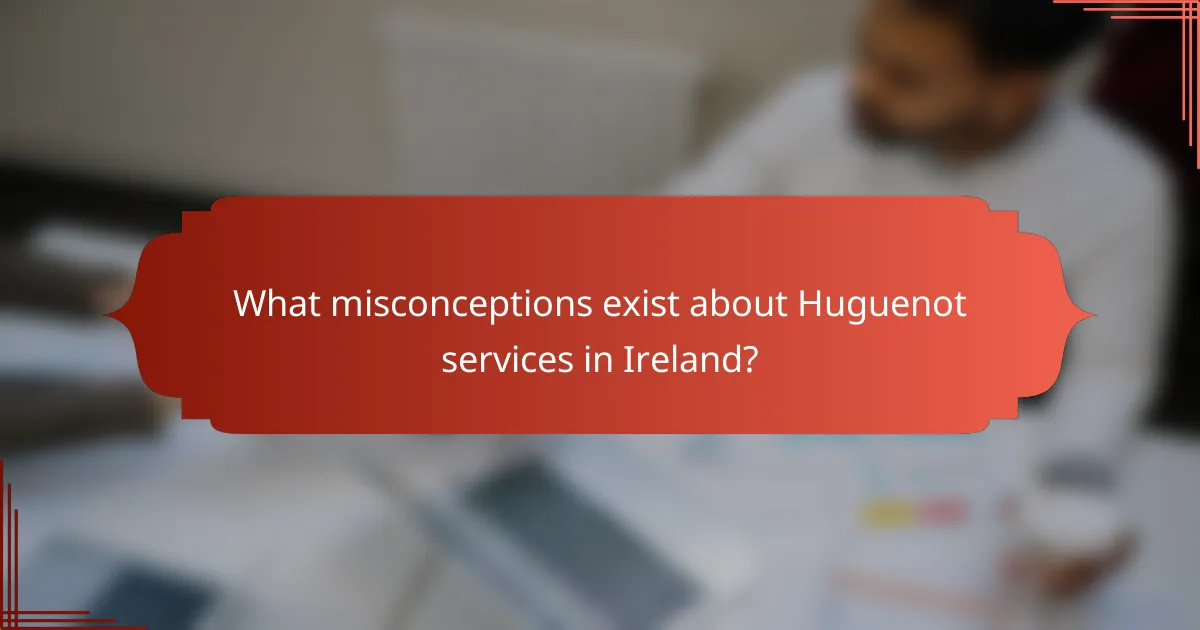The Huguenot services in Ireland are often misunderstood, leading to misconceptions about their historical significance and community contributions. By clarifying their specific offerings and community outreach efforts, we can better appreciate the vital role these services play in cultural preservation and social cohesion within local communities.

What misconceptions exist about Huguenot services in Ireland?
Many misconceptions surround Huguenot services in Ireland, often stemming from a lack of understanding of their historical context and community roles. These misunderstandings can lead to misinterpretations of their contributions and practices within Irish society.
Common myths debunked
One prevalent myth is that Huguenot services are exclusively religious gatherings. In reality, these services often encompass cultural and social activities that strengthen community ties. Another misconception is that Huguenots are a homogenous group; however, they represent diverse backgrounds and traditions.
Additionally, some believe that Huguenot services are no longer relevant today. In fact, many communities actively participate in preserving their heritage through various events and outreach programs, demonstrating their ongoing significance.
Historical inaccuracies explained
Historical inaccuracies often arise from oversimplified narratives about the Huguenots’ arrival in Ireland. Many assume they fled solely for religious reasons, overlooking the economic and social factors that influenced their migration. This broader perspective is essential to understanding their integration into Irish society.
Furthermore, the timeline of Huguenot settlement is frequently misrepresented. While many arrived in the late 17th century, their influence continued well into the 18th and 19th centuries, contributing to various sectors such as commerce and industry.
Misunderstandings about community roles
There is a common misunderstanding that Huguenots primarily served as artisans or tradespeople. While many did excel in these roles, they also held positions in finance, education, and politics, significantly impacting Irish society. This diverse participation highlights their multifaceted contributions beyond mere craftsmanship.
Moreover, some people believe that Huguenot communities are insular and disconnected from broader society. In reality, they have historically engaged with their neighbors and contributed to local culture, fostering a rich exchange of ideas and traditions that benefit the wider community.

How do Huguenot services benefit local communities?
Huguenot services provide significant advantages to local communities by promoting cultural preservation, fostering community involvement, and enhancing educational opportunities. These services help strengthen social ties and ensure that the history and traditions of the Huguenot heritage are maintained and celebrated.
Support for cultural heritage
Huguenot services play a crucial role in preserving the cultural heritage of the Huguenot community. They organize events, exhibitions, and festivals that showcase traditional crafts, music, and cuisine, allowing local residents to engage with and appreciate this rich history.
By collaborating with local artists and historians, these services create platforms for storytelling and cultural exchange, ensuring that the unique contributions of the Huguenots are recognized and valued within the broader community.
Community engagement initiatives
Community engagement initiatives led by Huguenot services aim to bring people together through various activities, such as volunteer opportunities and collaborative projects. These initiatives encourage residents to participate in community service, fostering a sense of belonging and shared purpose.
Examples include neighborhood clean-up days, cultural workshops, and intergenerational events that connect younger and older community members, enhancing social cohesion and mutual understanding.
Educational programs and resources
Huguenot services offer educational programs and resources that benefit both children and adults. These programs often include workshops, lectures, and guided tours that delve into the history and significance of the Huguenot experience.
Additionally, partnerships with local schools can provide students with access to historical materials and expert speakers, enriching their understanding of cultural diversity and history. Such resources can help foster a more inclusive educational environment that values all cultural narratives.

What clarifications are needed regarding Huguenot services?
Clarifications about Huguenot services often revolve around their specific offerings, community outreach efforts, and funding sources. Understanding these aspects can help dispel misconceptions and provide a clearer picture of their role and impact.
Clarifying service offerings
Huguenot services typically encompass a range of support mechanisms, including educational programs, social services, and cultural preservation initiatives. These offerings aim to assist individuals and families in need while promoting the Huguenot heritage.
For example, educational programs may include language classes and vocational training, while social services could involve counseling and housing assistance. It’s essential to inquire directly about available services, as they can vary by location and community needs.
Understanding community outreach
Community outreach is a vital component of Huguenot services, focusing on building relationships and providing resources to those in need. This outreach often includes partnerships with local organizations and participation in community events.
Effective outreach strategies may involve hosting informational workshops, distributing resources, or offering volunteer opportunities. Engaging with the community helps to raise awareness about available services and fosters a sense of belonging among Huguenots and the broader population.
Addressing funding sources
Funding for Huguenot services typically comes from a mix of private donations, grants, and community fundraising efforts. Understanding these sources is crucial, as they directly impact the sustainability and scope of the services offered.
Many organizations rely on local support and government grants to maintain their programs. It’s advisable for potential beneficiaries to explore these funding avenues, as they may also provide opportunities for community involvement and support.

How can one access Huguenot services in Ireland?
Accessing Huguenot services in Ireland typically involves connecting with local organizations that cater to the Huguenot community. These services may include cultural events, historical resources, and community support, often facilitated through specific contact points and online platforms.
Contact information for local services
To access Huguenot services in Ireland, start by reaching out to local organizations such as the Huguenot Society of Great Britain and Ireland. They can provide details on community events and resources. Additionally, local churches with Huguenot heritage may offer support and connection opportunities.
Here are a few key contact points:
- Huguenot Society of Great Britain and Ireland: [email protected]
- Huguenot Church in Dublin: [email protected]
Online resources and platforms
Several online platforms provide valuable resources for those interested in Huguenot services in Ireland. Websites like the Huguenot Society’s official site offer access to historical documents, research materials, and community news. Social media groups dedicated to Huguenot heritage can also be a great way to connect with others and stay informed.
Consider visiting genealogy websites that specialize in Huguenot ancestry, as they often have forums and databases that can help you trace your roots and connect with others in the community.
Event participation details
Participating in Huguenot events is an excellent way to engage with the community. These events may include cultural festivals, historical lectures, and church services. Keep an eye on local announcements or the Huguenot Society’s website for upcoming events.
When attending events, it’s advisable to register in advance if required, as some may have limited capacity. Engaging with community members during these events can provide deeper insights into Huguenot culture and history.

What criteria should be considered when choosing Huguenot services?
When selecting Huguenot services, consider factors such as service quality, community relevance, and the expertise of the providers. These criteria ensure that the services effectively meet the needs of the Huguenot community and contribute positively to its development.
Evaluating service effectiveness
To evaluate the effectiveness of Huguenot services, assess their outcomes in relation to community needs. Look for measurable indicators such as user satisfaction, service accessibility, and the impact on community cohesion.
Consider gathering feedback through surveys or focus groups to understand the experiences of service users. This qualitative data can provide insights into areas for improvement and highlight successful initiatives.
Assessing community impact
Assessing the community impact of Huguenot services involves examining how these services influence social, cultural, and economic aspects of the community. Key factors include the enhancement of cultural identity, support for local businesses, and the promotion of social inclusion.
Engage with community members to gauge their perceptions of the services’ contributions. Regular community meetings can facilitate discussions about the services’ effectiveness and encourage collaborative solutions to any challenges faced.

What emerging trends are shaping Huguenot services in Ireland?
Emerging trends in Huguenot services in Ireland are primarily focused on modernization, collaboration, and digital engagement. These trends aim to enhance community outreach and improve service delivery to better meet the needs of the Huguenot population.
Modernization of outreach methods
The modernization of outreach methods involves adopting new technologies and communication platforms to connect with the Huguenot community. This can include using social media, mobile apps, and online forums to disseminate information and gather feedback.
For instance, organizations may implement SMS alerts or email newsletters to keep community members informed about events and services. This shift towards digital communication helps to reach a wider audience and engage younger generations more effectively.
Increased collaboration with local organizations
Increased collaboration with local organizations is crucial for enhancing the effectiveness of Huguenot services. By partnering with community groups, charities, and government agencies, Huguenot organizations can pool resources and share expertise.
Such collaborations can lead to joint events, workshops, and support services that cater to the specific needs of the Huguenot community. For example, working with local health services can provide access to health screenings and educational programs tailored to community members.
Focus on digital engagement strategies
A focus on digital engagement strategies is essential for reaching the Huguenot community in today’s technology-driven world. This includes creating user-friendly websites and engaging social media content that resonates with the community’s interests and needs.
Organizations should consider hosting virtual events, webinars, and online discussions to foster a sense of community and encourage participation. By leveraging digital tools, Huguenot services can enhance visibility and accessibility, ensuring that members stay connected and informed.
